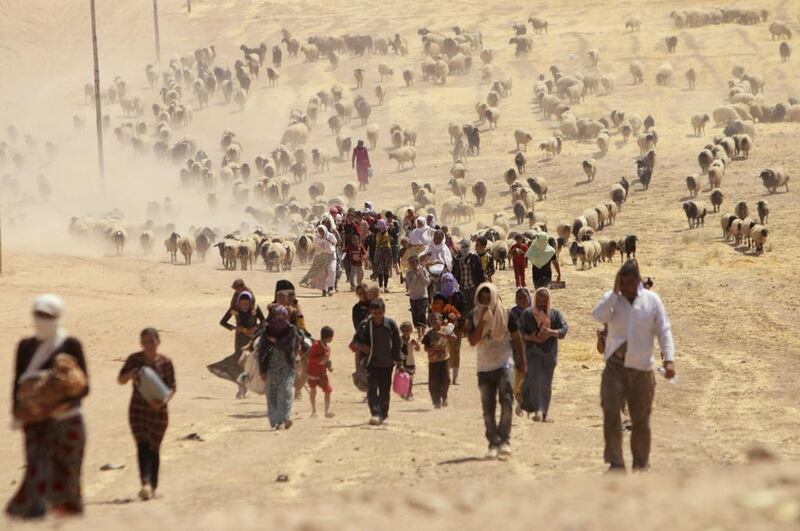In late November, Pope Francis visited Turkey on his first trip as pontiff to a predominantly Muslim country. Even as the US-led coalition carried out air strikes against ISIL militants in Syria and Iraq, the pope argued that inter-religious dialogue – not just military intervention – was needed to deal with the extremism that threatens Christians and other religious minorities in the Middle East.
“Fanaticism and fundamentalism, as well as irrational fears, which foster misunderstanding and discrimination, need to be countered by the solidarity of all believers,” the pope noted.
His comments came at the end of a particularly cruel year for minorities in the Middle East. When ISIL extremists captured Mosul in the summer, Christian residents were given an ultimatum: they could convert to Islam, pay a religious tax, be driven out of their homes, or face death. Many fled to Turkey or the Kurdish autonomous region in northern Iraq.
In early August, ISIL fighters mounted an offensive to advance on Erbil, the Kurdish capital. Thousands of Iraqi Christians and Yazidis in northern Iraq were forced from their homes. They took refuge on Mount Sinjar.
The world grew alarmed as ISIL militants besieged the mountain, fearing a genocide.
Pope Francis and his Orthodox Church counterpart, Ecumenical Patriarch Bartholomew, vowed to work together to prevent the exodus of Christians from the region.
In a joint statement, they said they could not resign themselves to a Middle East without Christians. “They have professed the name of Jesus there for 2,000 years,” the pope and the patriarch pointed out. They encouraged “constructive dialogue with Islam based on mutual respect and friendship”.
When the US invaded Iraq in 2003, 1.5 million Christians lived there. Today, it has dwindled to fewer than 400,000 – and many of those are threatened by ISIL.
The current status of religious minorities in the region is indeed dire, which is a shame if one considers the long history of tolerance within Islam for other faith communities.
Islam coexisted with other faiths for more than a thousand years. The weight of Islamic history is skewed toward moderation and includes tolerance for other faiths. But in the past 50 years, militants and some regimes that favour a literalist approach to revealed texts have imposed more austere interpretations of Islamic law. These groups are obsessed with punitive aspects of the Quran, as opposed to the sections that emphasise forgiveness.
Some minority communities were able to coexist with Islam because they emphasised their one shared feature: they were all ahl Al-Kitab, or people of the book, which is to say, a revealed text.
The Quran singles out Jews, Christians and Sabaeans as possessors of books that are recognised by Islam as revealed by God. As the Islamic empire expanded, Jews and Christians were given legal status as protected subjects and they were allowed to practise their faith, govern their communities and were exempt from military service in exchange for paying a special tax, the jizyah.
Other groups – including the Samaritans, Yazidis and Zoroastrians – also managed to secure the label of people of the book. Consequently, they too were able to coexist with the dominant religion. Clearly, Islam was well able to accommodate ideas from elsewhere and did not seek to suppress older faiths.
In his powerful book, In the Name of Identity, Lebanese novelist Amin Maalouf, a member of the Greek Catholic minority, describes how in its early conquests, Islam had developed a “protocol of tolerance”. This allowed minority communities to remain in their towns and villages, practising their faiths. He found it unlikely that this would have occurred if a Christian majority had conquered an Islamic minority.
This “remarkable ability to coexist” is a hallmark of Islam and one that we must not allow to be overshadowed by the rise of ISIL and other militants.
Mohamad Bazzi is a journalism professor at New York University and a former Middle East bureau chief at Newsday.
On Twitter: @BazziNYU





